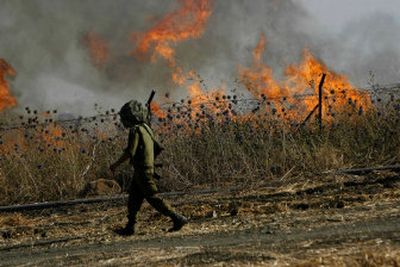11 die in Mideast fighting

BEIRUT, Lebanon – Israeli bombing in Lebanon on Sunday killed at least six civilians and three Hezbollah fighters, and Hezbollah fired rockets that killed two people in the Israeli city of Haifa.
In Beirut, U.N. humanitarian chief Jan Egeland toured bombed-out areas of the Lebanese capital and called Israel’s destruction in the city “a violation of humanitarian law.” He said he saw “destruction, block after block, and mostly in residential areas.”
Secretary of State Condoleezza Rice left Washington on Sunday for a brief visit to Israel, and then planned to go to the Palestinian headquarters in the West Bank and an international conference on the conflict in Rome.
Rice said a cease-fire was urgent, but that conditions for it must lead to a “sustainable” peace. Speaking with reporters on her Air Force jet, Rice said a lasting arrangement would have to disarm Hezbollah and allow Lebanon’s weak government to extend its writ across the entire country.
German Foreign Minister Frank-Walter Steinmeier and French Foreign Minister Philippe Douste-Blazy were in Israel on Sunday seeking an end of the fighting.
There was little optimism, however, that the two-week war in Lebanon would stop soon.
The war has made even factions in Lebanon that don’t support Hezbollah increasingly angry at Israel. Israeli officials, meanwhile, indicated that they might accept a multinational peacekeeping force in Lebanon eventually, but that for now the fight would continue. The Israeli military seeks to cripple Hezbollah’s militia so that it can no longer fire rockets from Lebanon into Israel.
Hezbollah operates in Lebanon as a political party and charitable organization, while its militia fights against Israel. Hezbollah sparked the clash on July 12 by capturing two Israeli soldiers and killing eight others in a cross-border assault.
“Hezbollah wanted to set the area in flames,” said Israeli Foreign Minister Tzipi Livni. She called the Lebanese government’s inability to police the southern part of its country “unacceptable.”
Palestinian political scientist Abed el-Majeed Sweilem said Israel was in a strong position as long as fighting continued. “If a cease-fire were to take place today, Israel would not have accomplished its stated goals and would look weak. Hezbollah might even look victorious to the Arab world. Israel will not allow that to happen. The fighting will continue,” he said.
Israel on Sunday bombed Sidon, a port city that has been receiving thousands of refugees fleeing villages along the border with Israel and which has come under attack in recent days. Israeli aircraft also bombed a textile factory in al-Manara, near the Lebanon-Israel border, killing one person. A strike on a village near the port city of Tyre killed a boy, and missile hit a minibus carrying people fleeing toward Tyre, killing three people.
A Lebanese photographer, Layal Nejim, 23, was killed when a missile struck her taxi in southern Lebanon.
Israeli ground forces, meanwhile, expanded efforts to drive Hezbollah out of southern Lebanon. After clearing the nearly deserted town of Maroun al-Ras of fierce resistance, Israeli artillery began shelling areas farther north. And while heavy caliber machine gun fire could be heard, there did not appear to be any return fire.
The fighting has killed an estimated 360 Lebanese and 36 Israelis. According to U.N. figures, 600,000 Lebanese, more than 15 percent of the population, have been forced to flee their homes.